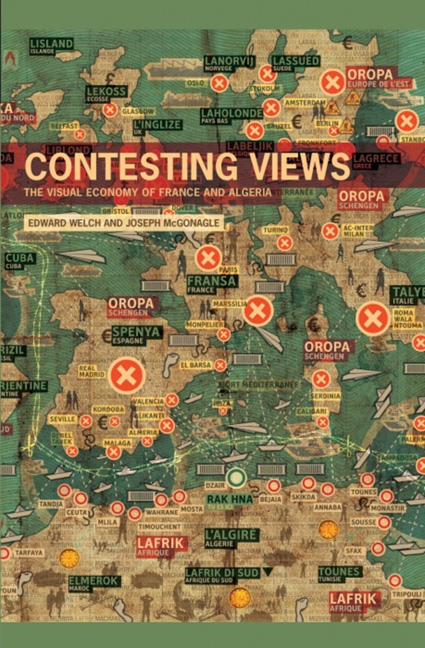Book contents
- Frontmatter
- Contents
- List of Illustrations
- Acknowledgements
- Introduction: Visualising the Franco-Algerian Relationship
- I Algerian Pasts in the French Public Sphere
- II Mapping Franco-Algerian Borders in Contemporary Visual Culture
- 4 War Child: Memory, Childhood and Algerian Pasts in Recent French Film
- 5 Bridging the Gap: Representations of the Mediterranean Sea
- 6 A Sense of Place: Envisioning Post-Colonial Space in France and Algeria
- Conclusion
- Notes
- Bibliography
- Index
4 - War Child: Memory, Childhood and Algerian Pasts in Recent French Film
from II - Mapping Franco-Algerian Borders in Contemporary Visual Culture
- Frontmatter
- Contents
- List of Illustrations
- Acknowledgements
- Introduction: Visualising the Franco-Algerian Relationship
- I Algerian Pasts in the French Public Sphere
- II Mapping Franco-Algerian Borders in Contemporary Visual Culture
- 4 War Child: Memory, Childhood and Algerian Pasts in Recent French Film
- 5 Bridging the Gap: Representations of the Mediterranean Sea
- 6 A Sense of Place: Envisioning Post-Colonial Space in France and Algeria
- Conclusion
- Notes
- Bibliography
- Index
Summary
In keeping with the heightened awareness of the Algerian War provoked by key anniversaries during the first decade of the twenty-first century (fortieth anniversary of 17 October 1961 and the ceasefire of March 1962; fiftieth anniversary of the start of the war), the period also saw a distinctive surge in the number of French-produced or co-produced feature-length films that explicitly tackled the subject of the conflict. Alain Tasma's Nuit noire (2005), for example, dramatised the events leading up to 17 October 1961 and the night itself in Paris. Philippe Faucon's La Trahison (2006) and Florent Emilio Siri's L'Ennemi intime (2007) focused on French military experiences in Algeria. Laurent Herbiet's Mon colonel (2006) weaved together scenes set in present-day France with flashbacks from wartime Algeria in its examination of French army uses of torture. Meanwhile, Hugues Martin and Sandra Martin broke with the realist conventions of these films, setting their unusual supernatural thriller Djinns (2010) in the Algerian Sahara in 1960.
Although far from the first French films to address the Algerian War, several reasons can be advanced to explain this concentrated number of releases post-2000 of films wholly or partially set during the wartime period. Jean-Pierre Jeancolas (2007: 44) has argued that French directors have historically been reluctant to film war at the time of its fighting, choosing instead to represent it much later on. Moreover, fear of censorship by the French state during the conflict itself undoubtedly encouraged self-censorship amongst filmmakers, consequently reducing the likelihood of warfare scenes appearing in films released at the time. Furthermore, Benjamin Stora (2002) has suggested that a period of thirty or forty years following the end of a war may be necessary before certain memories and realities of it can become widely acknowledged publicly, a point ostensibly substantiated by the 1992 release of Bertrand Tavernier and Patrick Rotman's documentary film La Guerre sans nom, which foregrounded the first-hand testimony of a range of French army conscripts and soldiers during the Algerian War, many of whom had never before spoken publicly of their wartime experiences.
- Type
- Chapter
- Information
- Contesting ViewsThe Visual Economy of France and Algeria, pp. 93 - 120Publisher: Liverpool University PressPrint publication year: 2013



